- Home
- Raymond Benson
The Facts Of Death
The Facts Of Death Read online
The Facts of Death
By Raymond Benson
Ian Fleming Publications
IAN FLEMING PUBLICATIONS
E-book published by Ian Fleming Publications
Ian Fleming Publications Ltd, Registered Offices: 10-11 Lower John Street London
www.ianfleming.com
First published in the UK by Hodder and Stoughton 1998
First published in the USA by G.P.Putnam’s Sons 1998
Copyright © Ian Fleming Publications, 1998
All rights reserved
James Bond and 007 are trademarks of Danjaq, LLC, used under licence by Ian Fleming Publications Ltd
The moral right of the copyright holder has been asserted
This book is sold subject to the condition that it shall not, by way of trade or otherwise, be lent, re-sold, hired out, or otherwise circulated without the publisher’s prior consent in any form of binding or cover other than that in which it is published and without a similar condition including this condition being imposed on the subsequent purchaser
ISBN: 978-1-906772-54-3
JAMES BOND TITLES BY RAYMOND BENSON
NOVELS
Zero Minus Ten (1997)
The Facts of Death (1998)
High Time to Kill (1999)
DoubleShot (2000)
Never Dream of Dying (2001)
The Man With the Red Tattoo (2002)
FILM NOVELIZATIONS
(based on the respective screenplays)
Tomorrow Never Dies (1997)
The World is Not Enough (1999)
Die Another Day (2002)
SHORT STORIES
Blast From the Past (1997)
Midsummer Night's Doom (1999)
Live at Five (1999)
ANTHOLOGIES
The Union Trilogy (2008)
Choice of Weapons (2010)
ABOUT THE AUTHOR
Besides writing official James Bond fiction between 1996-2002, RAYMOND BENSON is also known for The James Bond Bedside Companion, which was published in 1984 and was nominated for an Edgar. His first two entries of a new series of thrillers, which Booklist called “prime escapism,” are The Black Stiletto and The Black Stiletto: Black & White. As “David Michaels” Raymond is the author of the NY Times best-sellers Tom Clancy’s Splinter Cell and Tom Clancy’s Splinter Cell - Operation Barracuda. He recently penned the best selling novelizations of Metal Gear Solid and its sequel Metal Gear Solid 2-Sons of Liberty, as well as Homefront: the Voice of Freedom, co-written with John Milius. Raymond’s original thrillers are Face Blind, Evil Hours, Sweetie’s Diamonds, Torment, Artifact of Evil, A Hard Day’s Death and the Shamus Award-nominated Dark Side of the Morgue. Visit him at his websites, www.raymondbenson.com and www.theblackstiletto.net.
FOR MY PARENTS
Morris H. “Benny” Benson
Beulah “Boots” Benson
CONTENTS
TITLE PAGE
COPYRIGHT PAGE
ABOUT THE AUTHOR
PROLOGUE
1 THE SMELL OF DEATH
2 A DAY IN THE CITY
3 AN EVENING IN THE COUNTRY
4 TOO CLOSE TO HOME
5 RENDEZVOUS ON CHIOS
6 TEQUILA AND LIMES
7 THE SUPPLIERS
8 MANSION ON THE HILL
9 THE SPERM BANK
10 OFFENSIVE ACTION
11 THE NEXT THREE STRIKES
12 HIDDEN AGENDA?
13 THE GREEK AGENT
14 THE NEW PYTHAGOREANS
15 BIOLINKS
16 ROMANOS
17 QUEEN OF THE GODS
18 A MURDERER’S TOMB
19 THE NUMBER KILLER
20 GODS NEVER DIE
21 BY THE SKIN OF THE TEETH
22 SECRETS OF THE DEAD
23 INDEPENDENCE DAY
24 GHOST TOWN
25 THE FACE OF DEATH
26 THE WORLD IS NOT ENOUGH
ACKNOWLEDGMENTS
PROLOGUE
IT WAS SUPPOSED TO HAVE BEEN ROUTINE.
In early October, Carl Williams, a fifty-eight-year-old African-American, had gallbladder surgery at Veterans Hospital in Los Angeles. He needed a blood transfusion to make up for what he had lost during the procedure. He was type A, and there was plenty of that in supply. The operation was a complete success, and he spent an hour in the recovery room before being wheeled back to his bed.
Several hours later, as his wife sat by his side reading, Williams began to choke. At first, Mrs. Williams thought some juice he was sipping had gone down Carl’s windpipe. She slapped his back, but it didn’t seem to work. Carl’s eyes started to bulge and he panicked. Mrs. Williams screamed for the nurse.
A code blue was declared. A doctor rushed in and attempted to save the patient, who went into cardiac arrest just as they were fitting an oxygen mask over his face.
Carl Williams died fifteen minutes after the onset of the symptoms. His wife was hysterical. The hospital staff were shocked and bewildered. The doctor ordered that a postmortem examination be performed.
The next morning, Mrs. Williams was sitting in her kitchen in Van Nuys, trying to make sense of what had happened to her husband. It must have been the hospital’s fault. She was going to speak to a lawyer that very day.
As she stood up to pour some more coffee, she inexplicably felt her throat close. Gasping for air, she lunged for the telephone to dial 911. She managed to get through, but could barely speak into the receiver to tell them where to send the ambulance.
When the paramedics arrived, she was dead.
Halfway across the metropolis of Los Angeles, in Culver City, the nurse who had first attended to Carl Williams’s emergency also died of respiratory failure and cardiac arrest as she was unloading groceries from the back of her car. Fifteen minutes later, in Pasadena, the doctor who had rushed into the room to help the nurse collapsed of the same ailment. He had been on the fourth hole of his favorite golf course.
By the end of the day, eight more people who had come into contact with Carl Williams were dead.
The next day there were several more.
By the third week of October, health officials realized they had a crisis on their hands. Although they tried to keep the mysterious epidemic a secret, news leaked out and was reported in the Los Angeles Times. A small story ran in the Times, but few people in London paid much attention to it.
By the end of October, thirty-three people had died. Health officials were stumped and scared.
Halfway around the world, in Tokyo, Hiroshi Nagawa received his October injection. It was his monthly shot of blood to help combat the leukemia that he had contracted five months ago. Doctors were hopeful that the transfusions would prolong his life at least another six months. Hiroshi was optimistic, for he felt much better every time he got a shot.
Hiroshi went from the doctor’s office to his job as a computer programmer. The day went well, but he began to feel a little dizzy as he got on the underground train to go home. In the middle of the packed train, Hiroshi suddenly felt as if his esophagus had been clamped with a vise. Thankfully, the train was just pulling into a station. Choking horribly, he pushed his way through the crowd of people to the opening doors. He stumbled out onto the platform and collapsed a few feet away from the train.
Everyone in the subway car with Hiroshi that afternoon was concerned, but they went about their business and let the medics handle the situation. Little did they know that in twenty-four hours, they too would be in the morgue.
ONE
THE SMELL OF DEATH
THE TABLEAU OF PAIN AND SUFFERING MIGHT HAVE BEEN A FREEZE-FRAME from a macabre dance of death.
The twelve men—three corporals and nine privates—were sprawled abo
ut in various positions in the barracks room. They were fully dressed. One man was half on, half off a cot. Three were piled together, clutching one another in a final embrace. All of them had vomited and bled from the nose and mouth. They had clearly experienced a horrible death.
The team of four investigators dressed in protective clothing made a thorough search of the premises. Each wore a Willson AR 1700 full face gas mask with respirator and “in-cheek” filters, airtight goggles, a hood, an impermeable butyl rubber suit, eighteen-gauge rubber gloves and boots. Every inch of skin was covered. The investigators were thankful that the gas masks blocked out the stench of death. They were sweating profusely beneath the suits, for in late October, it was still hot in southern Cyprus.
James Bond peered through the eyepieces of his gas mask, taking in every detail. Twelve soldiers had been killed by an as yet unknown chemical agent, possibly administered through the air ducts. It seemed the only possible explanation. Equally disturbing was the number “3” painted in red on the wall of the room. Beneath the number, on the floor, was a six-inch-high alabaster statuette of the ancient Greek god Poseidon.
Bond watched the two British SAS investigators do their work and then followed them outside into the sun. One investigator, the sole Greek in the team, remained inside to finish making notes and to take photographs.
The men removed their gas masks and hoods. The temperature was already eighty-five degrees. It would have been a good day for a swim.
The British Sovereign Base Areas in the Republic of Cyprus cover approximately three percent of the island’s land area. The Western Sovereign Base Area, which consists of the Episkopi Garrison buildings and the Akrotiri RAF airfield, and the Eastern Sovereign Base Area—the garrison at Dhekelia—remained under British jurisdiction when the Treaty of Establishment created the independent Republic of Cyprus in 1960. Prior to that time, Cyprus had been a British crown colony.
Bond had been dispatched to Cyprus shortly after midnight and had been shuttled to Akrotiri by a Royal Navy aircraft. He had been met by Captain Sean Tully and taken directly to Episkopi, the area which housed the Sovereign Base Areas Administration and the headquarters of the British Forces Cyprus. James Bond always thought the island was a lovely place, with its beautiful beaches, its rolling hills in the north, its near-perfect climate, and its quaint and colorful cities. It was unfortunate that Cyprus had such a turbulent recent history.
It was an unnamed British officer who had drawn a line with a green marker across the map in 1963, when tensions between the Greek and Turkish Cypriots culminated in violence. The United Nations moved in shortly thereafter in an attempt to keep the peace along the aptly named Green Line. Eleven years later, as a result of an attempted coup by the Greek government and the Turkish invasion of the northern part of the island in reaction to that attempt, the island was divided not just by a symbolic Green Line, but by a physical and political one. Today, Her Majesty’s Government, along with the UN, recognizes only the government of the Republic of Cyprus, which administers the southern two thirds of the island. The socalled Turkish Republic of Northern Cyprus, which illegally occupies the northeast third of the island, is not recognized by any nation other than Turkey. The situation has been a source of tension, mistrust, and conflict for over thirty years.
The current disaster had struck in a barracks near the Episkopi helicopter landing site. Bond had been joined by two SAS forensic identification specialists from London and, at the last minute, by a member of the Greek Secret Service. He was a bit puzzled by the presence of the Greek agent, who was still inside the barracks taking notes. M had advised him that a Greek agent would be contacting him in Episkopi, but this was obviously a British matter, as it involved British military personnel and occurred on territory governed by neither the Republic of Cyprus nor Greece.
Winninger, one of the London investigators, wiped the sweat from his brow and asked, “Commander Bond, do you have any preliminary impressions?”
“It was some kind of aerosol agent, I would imagine,” Bond said. “The number on the wall and the little statue are some kind of signature that the killer or killers left behind. I understand there was something similar at Dhekelia two days ago.”
“Right,” the second man, Ashcraft, said. “A small squad of men was killed by a nerve toxin called sarin. The same stuff that was used in a Japanese underground train recently by a religious fanatic.”
Winninger added, “And then there was poor Whitten two days before that.”
Bond nodded. He had been briefed. Christopher Whitten had been an MI6 operative in Athens. His body had been found by the Greek police sprawled on the steps of the Temple of Hephaisteion in the Ancient Agora near the Acropolis. He had died by an as yet unidentified poison, but Forensic Toxicology believed the cause of death to have been ricin, a deadly chemical derived from the simple castor bean plant.
In all three cases, the perpetrators had left a number painted near the body or bodies. The number “1” had been scrawled on a rock by Whitten’s head. The number “2” had been painted on the wall of the Dhekelia barracks where the small squad of soldiers died the other day. A similarity to the Episkopi incident was that another small statuette of a Greek god was left at the Dhekelia scene.
Ashcraft said, “And now we have the third attack in four days. Looks like we’ve got a serial terrorist or something… . One complete section and half of another from the platoon were killed. That’s three corporals and nine privates—three fire teams. It happened late last night after they had come in from drill. What do you make of the condition of the bodies, Ray?”
Winninger rubbed his chin. “From the amount of bleeding the victims experienced—from nearly every orifice of their bodies—it appears to be Tricotheneces. Wouldn’t you agree?”
“Yes,” Ashcraft said. “We’ll have to get the lab to verify, of course. Terrible way to go.” He turned to Bond. “Tricotheneces is a poison that causes radical bleeding from the eyes, ears, and mouth, internal bleeding, burns, convulsion and death—all within half an hour.”
Bond was familiar with the various types of chemicals used in terrorist attacks and in warfare.
“Is it my imagination, or can I smell their bodies from out here?” Winninger asked.
The Greek agent emerged from the barracks, still wearing the gas mask and protective hood. Now out in the fresh air, the gas mask and coverings were quickly removed, revealing a head of long, black hair. She had Mediterranean features—tan skin, thick eyebrows, brown eyes, full lips, a large but not unattractive nose, and a long neck. She was unusually tall—nearly six feet. Bond and the other two men were surprised. They hadn’t realized the agent was a woman when she walked into the barracks after them. She hadn’t spoken and the protective uniform covered any hint of female shape.
“Are you from the NIS? You’re Mirakos?” Winninger asked.
“That’s right,” she said. “Niki Mirakos of the Greek National Intelligence Service.” She pronounced her first name “Nee-kee.”
“What are you doing here, exactly?” Ashcraft asked. “If you don’t mind my asking.”
“I’m investigating these terrorist attacks, just as you are,” she said with a look of disdain. “Your man Whitten was found in a public area of Athens—in a national park that was a holy place for the ancient Greeks, no less. These attacks are not random. There is a purpose behind them. My government has an interest in what has happened.”
“Maybe you can fill us in on your hypothesis, then?” Ashcraft said.
“Later,” she said. “I want to get out of these hot clothes and take a shower.” She turned to Bond. “You’re 007, aren’t you?”
Bond held out his hand. “Bond,” he said. “James Bond.”
“We’re supposed to have a little talk,” she said. She glanced at the two other officers and added, “Alone.”
Bond nodded. He led her away from the other two toward the building in the barracks that had been assigned to them as temporary qu
arters. As they walked, she unzipped her coveralls, revealing a white T-shirt soaked in sweat. Her full breasts were perfectly molded into the shirt. Bond couldn’t help stealing a glance or two as they walked. She wasn’t “beautiful” in the cover girl sense, but she exhibited an air of sensuality that made her extremely attractive.
“We believe this to be the work of terrorists specializing in chemical and biological weaponry,” she said. “The targets thus far have been British, but we believe there is something behind the attacks which will ultimately involve Greece.” She had a fairly thick accent, but her English was very good. Although most people under the age of forty in Greece have learned English, very few practice it on a daily basis.
“Do you have any idea who these people are?”
“No, and that’s part of the problem. We’re still investigating the death of your man Whitten, with the cooperation of your government, of course.”
“Is there a significance in the site where the body was dumped?” he asked.
“Perhaps. The Ancient Agora was the Athenian marketplace. You know about the coin?”
Bond nodded. “Whitten had an ancient Greek coin in his mouth.”
Niki continued, “That’s right. The ancient Greeks believed that the dead should have a coin handy to give to Charon, the boatman on the River Styx, so that he could ferry them across the river to Hades. A dead person was usually buried with a coin in their mouth to use as fare.”
“So the body placement, the coin, the number … are all symbolic,” Bond said.
“Of what?” she said. “If we can find the connection between that murder and the incidents here on Cyprus, it would be a big help.”
“The statuettes could be a substitute for the temple,” Bond said. “Ideally, maybe the killers wanted to send some sort of message linking the deaths to ancient Greece. That’s why Whitten’s body was dropped where it was. Since they couldn’t do that here on Cyprus, maybe the statuettes are supposed to symbolize the equivalent. Whatever that is.”

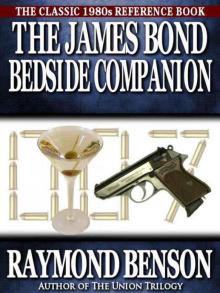 The James Bond Bedside Companion
The James Bond Bedside Companion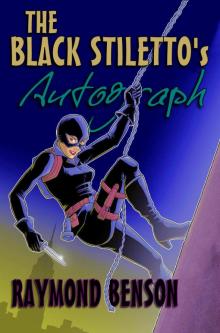 The Black Stiletto's Autograph
The Black Stiletto's Autograph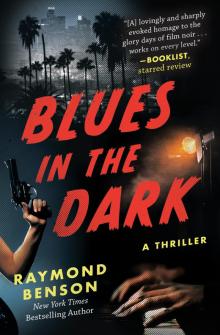 Blues in the Dark
Blues in the Dark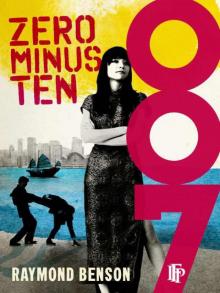 Zero Minus Ten
Zero Minus Ten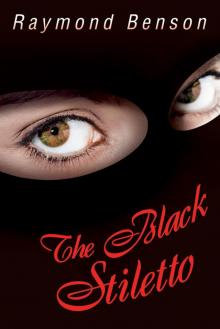 The Black Stiletto
The Black Stiletto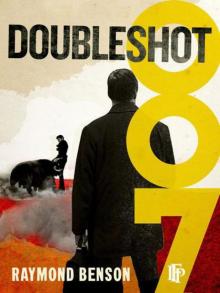 Doubleshot
Doubleshot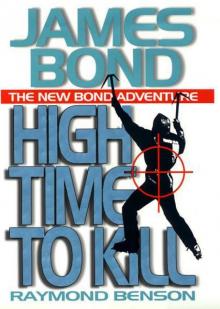 High Time To Kill rbb-3
High Time To Kill rbb-3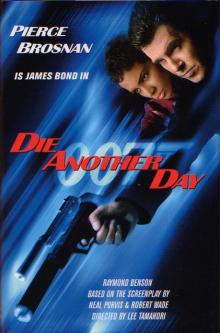 Bond Movies 07 - Die Another Day
Bond Movies 07 - Die Another Day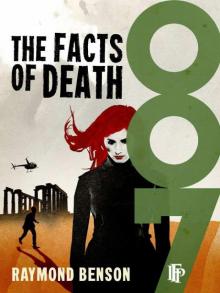 The Facts Of Death
The Facts Of Death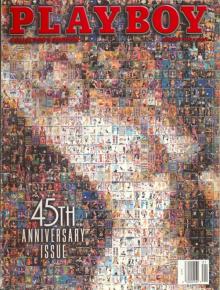 Midsummer Night's Doom
Midsummer Night's Doom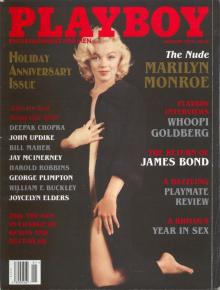 Blast from the Past
Blast from the Past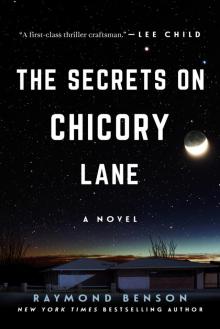 The Secrets on Chicory Lane
The Secrets on Chicory Lane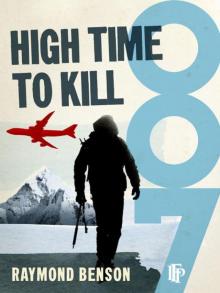 High Time To Kill
High Time To Kill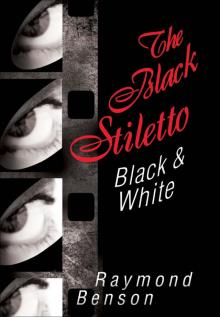 The Black Stiletto: Black & White
The Black Stiletto: Black & White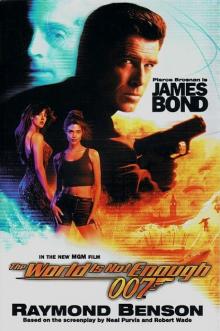 The World Is Not Enough jb-1
The World Is Not Enough jb-1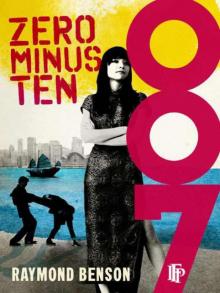 Zero Minus Ten rbb-1
Zero Minus Ten rbb-1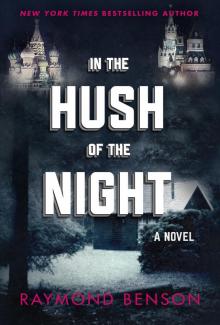 In the Hush of the Night
In the Hush of the Night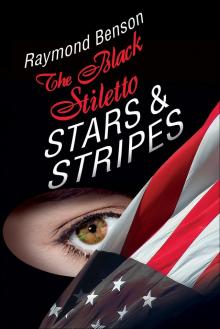 The Black Stiletto: Stars & Stripes
The Black Stiletto: Stars & Stripes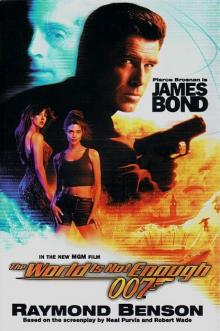 Bond Movies 06 - The World Is Not Enough
Bond Movies 06 - The World Is Not Enough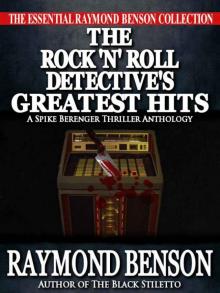 The Rock 'n Roll Detective's Greatest Hits - A Spike Berenger Anthology
The Rock 'n Roll Detective's Greatest Hits - A Spike Berenger Anthology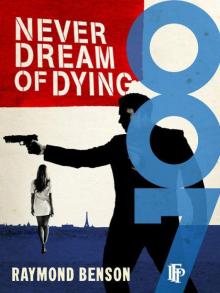 Never Dream Of Dying
Never Dream Of Dying